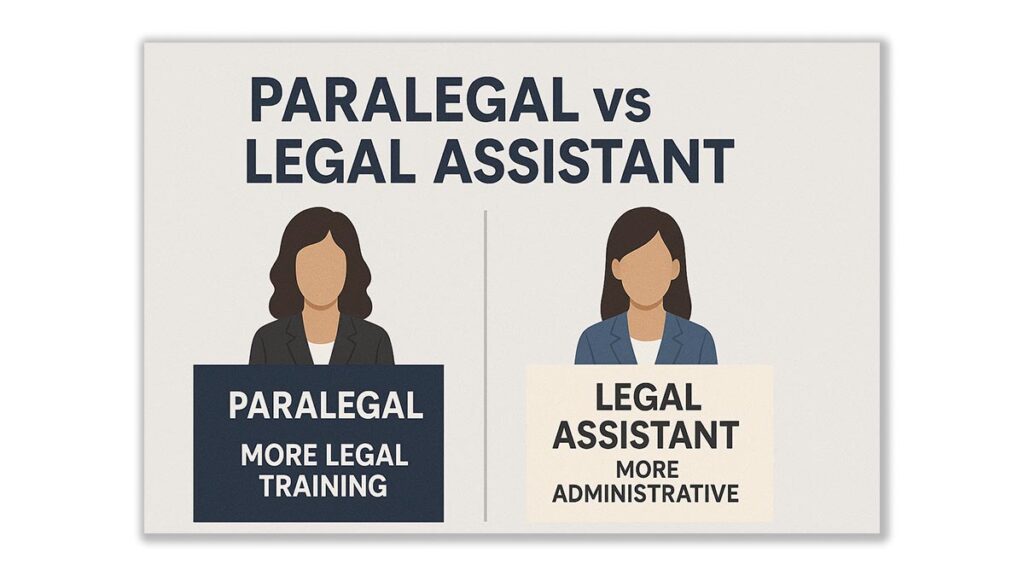The debate of paralegal vs legal assistant is common among those unfamiliar with the nuances of legal support roles. While both professionals are essential to the efficient functioning of law firms, their responsibilities, qualifications, and legal authority vary significantly. This article provides a detailed comparison to clarify their distinctions and highlight their importance within a legal team.

Paralegal vs Legal Assistant: Defining Each Role
Definition of Paralegal: Paralegals are trained legal professionals who perform substantive legal tasks under the supervision of an attorney. Their responsibilities include legal research, drafting legal documents, and assisting in trial preparation. They require specialized education and often hold certifications to demonstrate their expertise.
Definition of Legal Assistant: Legal assistants focus primarily on administrative support tasks, such as scheduling meetings, managing correspondence, and organizing case files. While their work is critical for maintaining office efficiency, it does not typically involve substantive legal tasks.
You may also be interested Legal Assistant Versus Paralegal: Understanding the Key Differences
Key Differences Between Paralegals and Legal Assistants
- Scope of Work
- Paralegal: Engages in tasks requiring legal knowledge, such as drafting pleadings, preparing discovery documents, and conducting legal research.
- Legal Assistant: Handles clerical tasks like filing documents, answering phones, and maintaining attorney calendars.
- Educational Requirements
- Paralegal: Often requires a degree in paralegal studies or certification from organizations like the National Association of Legal Assistants (NALA).
- Legal Assistant: Typically requires a high school diploma or an associate degree with strong organizational skills.
- Legal Authority
- Paralegal: Works closely with attorneys on case-specific tasks but cannot provide legal advice or represent clients.
- Legal Assistant: Has no direct involvement in legal casework and focuses on administrative efficiency.
Why Understanding Paralegal vs Legal Assistant Matters

For law firms, distinguishing between paralegal vs legal assistant is essential to optimize workflows and allocate resources effectively. Employing both roles allows firms to balance administrative and legal support, ensuring seamless operations. For clients, understanding these roles helps set realistic expectations about the type of assistance they will receive.
Paralegal vs Legal Assistant: How Law Firms Benefit from Employing Both Roles
- Increased Efficiency: Paralegals handle complex legal tasks, while legal assistants ensure smooth day-to-day operations. This collaboration enhances overall productivity.
- Cost-Effective Support: By delegating tasks to paralegals and legal assistants appropriately, law firms can reduce attorney workloads and operational costs.
- Better Client Experience: With paralegals focusing on case preparation and legal assistants managing communication and scheduling, clients receive comprehensive and timely support.
Ensure your intake team identifies high-quality cases from the start. Schedule a consultation to learn how Regentsrs can help your firm!
Choosing Between a Paralegal and a Legal Assistant
When deciding whether to hire a paralegal or a legal assistant, consider the following:
- Nature of Tasks: For substantive legal tasks like drafting documents or conducting research, hire a paralegal. For administrative support, a legal assistant is more suitable.
- Firm Size: Smaller firms may prioritize paralegals for their versatility, while larger firms often employ both roles for comprehensive support.
- Budget Considerations: Legal assistants are generally more affordable, making them ideal for firms seeking cost-effective administrative help.

How Regentsrs Supports Your Legal Team
At Regentsrs, we provide skilled paralegals and legal assistants tailored to meet your firm’s needs. Whether you require legal expertise or administrative support, our professionals ensure that your operations run smoothly and efficiently.
Need highly skilled legal support for your law firm? Get in touch with us to discuss your firm’s unique needs!
The comparison between paralegal vs legal assistant underscores their complementary roles within a law firm. By leveraging the strengths of each, firms can enhance productivity, reduce costs, and improve client satisfaction. Next, explore how virtual legal support services are reshaping the legal industry with flexible and scalable solutions.
Is a Paralegal the Same as a Legal Assistant?
Across U.S. law firms, titles like paralegal and legal assistant are often used interchangeably. But beneath that similarity lie important differences in legal training, billing authority, task complexity, and professional recognition. This article provides firm owners, managing partners, and hiring managers with clarity along with smart strategies for integrating virtual staffing and intake specialists to optimize costs and boost firm efficiency.
Origins, Definitions & Interchangeable Usage
ABA & Professional Body Definitions: The American Bar Association (ABA) treats “paralegal” and “legal assistant” as synonymous terms under its official definition:
A legal assistant or paralegal is a person, qualified by education, training or work experience who performs specifically delegated substantive legal work for which a lawyer is responsible.”
This definition formalizes the interchangeable usage of both titles. NALA, NFPA, and state bar efforts followed suit in early 2000s.
Professional versus colloquial use
Despite broad definitions, many firms draw real-world distinctions. Paralegals receive deliberate education and certifications, handling research and drafting. Legal assistants often focus more on clerical, administrative tasks.
Task Breakdown: Casework Versus Clerical Support
| Role | Core Tasks |
|---|---|
| Paralegal | Legal research, drafting motions, interviewing clients, assisting trial prep, managing case files |
| Legal Assistant | Calendar management, document formatting, client scheduling, billing, e-filing |
Survey and industry analysis
According to industry reports: legal assistants manage administrative office flow, while paralegals handle litigation support—like reviewing evidence and drafting pleadings. Other comparisons reinforce that paralegals are required to understand legal terminology and procedures at a deeper level.
Legal assistants may do basic research or formatting for pleadings, but paralegals execute higher-value legal work requiring critical analysis.
Education, Training & Certification
- Paralegals: Often hold associate or bachelor’s degrees in paralegal studies or related fields, sometimes supplemented by certification (NALA Certified Paralegal, NFPA Registered Paralegal).
- Legal Assistants: May enter with high-school diplomas and on-the-job training. Some employers prefer candidates with certificates or associate degrees. Certification is optional.
Candidates performing substantive tasks typically move toward paralegal certification to reflect actual responsibilities.
Billing & Compensation Differences
Legal assistants typically earn less than paralegals, reflecting task complexity.
Indeed reports averages:
- Legal Assistant: US $20.49/hour (~$42,600/year)
- Paralegal: US $24.00/hour (~$50,000–68,000/year)
BLS data combining both roles: $56,230/year, with top 10 % earning up to $98,990.
Firms that bill paralegal work directly tend to assign the paralegal title to justify higher hourly rates. Administrative time is either non-billable or billed at lower rates by legal assistants.
Regulatory & Ethical Oversight
ABA removed the term “legal assistant” from its policy in 2020, formally recognizing only “paralegal” for substantive roles.
State-level regulations vary:
- California: Paralegal regulated by statute; legal assistant titles have less formal standing.
- Other states: Titles remain discretionary, but ethics rules require that paralegals operate under attorney supervision.
Real-World Practices in U.S. Firms
- Larger and midsize firms: Often designate paralegals as litigation support professionals and legal assistants as clerical aides. Billing rates reflect title responsibilities.
- Smaller firms & hybrid roles: Smaller firms may combine tasks across both roles, hiring individuals to manage both substantive legal tasks and administrative duties—sometimes under the legal assistant title.
Career Pathways & Development
- Paralegals: Opportunity to advance into supervisory paralegal, specialist, or management roles. Many pursue law school to become attorneys.
- Legal Assistants: Advancement usually within administrative tracks—office manager, intake coordinator—or through additional education, they may transition to paralegal roles.
The Business Case: Virtual Staffing & Intake Support
Virtual-paralegal services (e.g., from Regentsrs) extend a firm’s capabilities:
- Enable billing of substantive tasks through paralegals
- Control overhead by avoiding full-time legal assistant hires
- Improve intake and case qualification before lawyers engage
Ensure your intake team identifies high-quality cases from the start. Schedule a consultation to learn how Regentsrs can help your firm!
Strategic Advice: Task Alignment and Staffing Efficiency
- Audit roles annually – Match tasks to the paralegal/legal assistant classification and credentials.
- Train and certify – Provide paralegal pathways to staff taking substantive responsibility.
- Make use of virtual teams – Scale with virtual paralegals and intake specialists.
- Track billing productivity – Monitor realization rates associated with paralegal vs admin tasks.
Need highly skilled intake specialists for your law firm? Get in touch with us to discuss your firm’s unique needs!
Can legal assistants perform paralegal work?
Yes—but firms should assess whether tasks require paralegal credentials and adjust staffing, billing rates, and supervision accordingly.
Paralegal and Legal Assistant Roles: Key Differences That Impact Profitability
Titles may blur, but the difference between a paralegal and legal assistant lies in task complexity, billing authority, and professional formation. As law firms retool for efficiency, distinguishing these roles—and leveraging virtual specialists—enhances profitability and client service.
A keystone topic—how virtual paralegal services can expand legal capacity while controlling costs.


